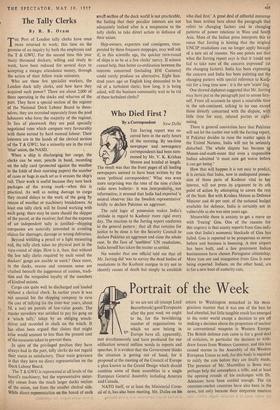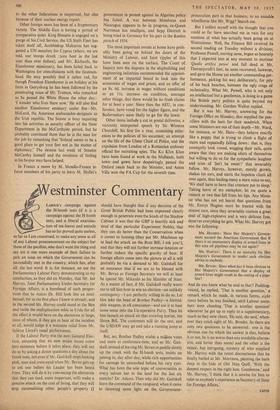Portrait of the Week
NATO itself, or at least the Ministerial Coun- cil of it, has also been meeting. Mr. Dulles on his return to Washington remarked in his most gracious manner that it was one of the best he had attended, but little tangible result has emerged to the outer world except a decision to put off making a decision about the proportion of nuclear to conventional weapons in Western Europe. The British defence cuts came in for a good deal of criticism, in particular the decision to with- draw forces from Western Germany, and this has caused storms in the Assembly of the Western European Union as well, for this body is required to ratify the cuts before they are finally made. The presence of Mr. Macmillan in Bonn may perhaps help thd atmosphere a trifle, and at least the opening rounds of his exchanges with Dr. Adenauer have been cordial enough. The six common-market countries have also been in the news, not only because their corporate reaction to the other federations is important, but also because of their nuclear energy report.
Other foreign news has been of a fragmentary variety. The Middle East is having a period of comparative quiet. King Hussein is engaged on a purge of his Civil Service, the US Sixth Fleet has taken itself off, Archbishop Makarios has sug- gested a UN mandate for Cyprus (where, we are told, our troops drank :nore beer in the last year than ever before), and Mr. Richards, the Eisenhower missionary, has been haled back to Washington for consultations with the fountain- head. He may possibly find it rather red, for though President Eisenhower is on holiday at his farm in Gettysburg he has been followed by the penetrating voice of Mr. Truman, who remarked as he passed the White House the other day : `I wonder who lives there now.' He will also find another Eisenhower emissary under fire—Mr. McLeod, the American ambassador-designate to the Irish republic. The Senate is busy inquiring into his activities as security officer of the State Department in the McCarthyite period, but he probably convinced them that he is the man for the job by remarking that 'Ireland seems to be a good place to get your feet wet in the matter of diplomacy.' The demise last week of Senator McCarthy himself and the revulsion of feeling in his favour may have helped.
In France a move by M. Mendes-France to force members of his party to leave M. Mollet's government in protest against its Algerian policy has failed. A war between Honduras and Nicaragua appears to be in progress, ex-Queen Narriman has smallpox, and Sepp Dietrich is being tried in Germany for his part in the Roehm putsch of 1934.
The most important events at home have prob- ably been going on behind the doors of the Ministry of Labour, and faint ripples of this have been seen on the surface. The Court of Inquiry into the disputes in the shipbuilding and engineering industries recommended the appoint- ment of an impartial board to look into the economics of wages and prices, and an offer of an 8s. 6d. increase in wages without conditions or an I Is. increase on condition, amongst other things, that there would be no fresh claims for at least a year. Since then the AEU, in con- ference, have voted for the higher figure, and the Boilermakers seem likely to go for the lower.
Other items include a cut in postal deliveries, a variously interpreted speech by Sir Winston Churchill, his first for a year, containing refer- ences to the policies of his successor, an attempt on the life of the Ulster Chief of Police, and the expulsion from London of a Rumanian embassy official for recruiting spies. The Ku Klux Klan have been found at work in the Midlands, both town and gown have despairingly passed the Oxford roads back to the Minister, and Aston Villa won the FA Cup for the seventh time.



































 Previous page
Previous page